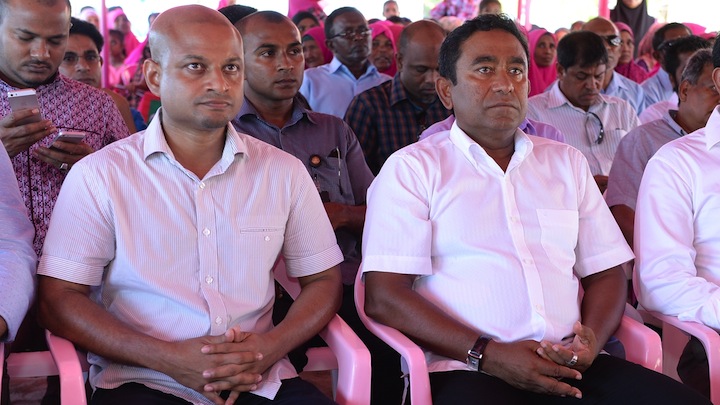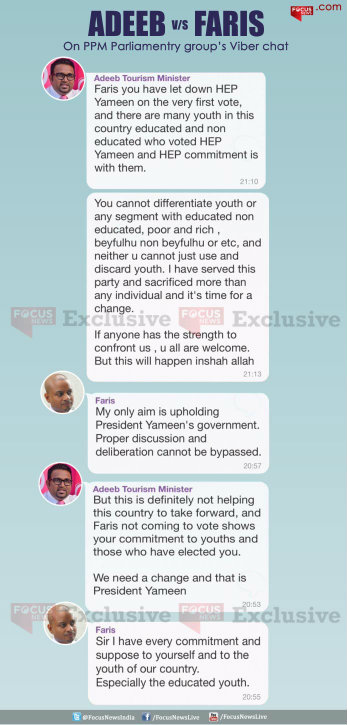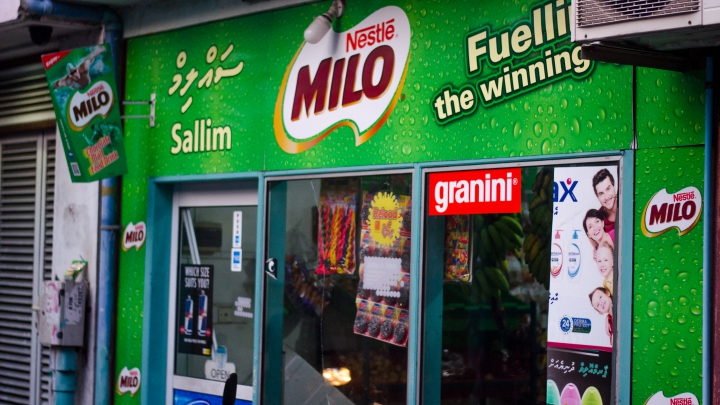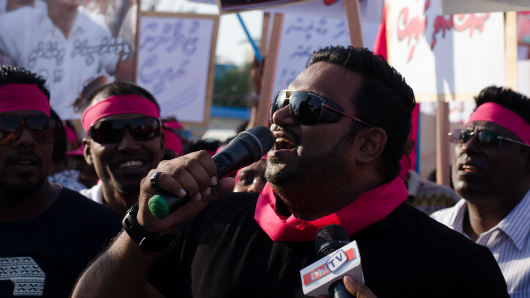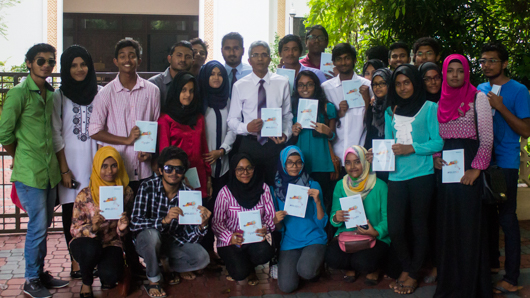A heated exchange on a social media group set up between MPs of the ruling Progressive Party of the Maldives (PPM) has been leaked and exposes a widening rift between President Abdulla Yameen and his-half brother and president of 30 years, Maumoon Abdul Gayoom.
In the Viber group, tourism minister Ahmed Adeeb reprimanded newly elected Progressive Party of Maldives (PPM) MP Ahmed Faris Maumoon for his absence from a vote on a constitutional amendment that set an age limit of 30 to 65 years for the presidency and vice president.
“Faris you have let down HEP Yameen on the very first vote,” Adeeb told the newly elected MP for Dhiggaru.
Faris is nephew to President Yameen and the eldest son of former President Gayoom.
Gayoom, is the leader of the PPM, and had opposed the change to set an upper age limit of 65 years. The former president, who is now in his early 80s, had served six terms from 1978 to 2008.
The ruling coalition is seeking to replace Vice President Dr Mohamed Jameel Ahmed with the 33-year-old tourism minister.
Tensions are reportedly running high within the PPM with Gayoom also unhappy with the vice president’s imminent impeachment.
Adeeb warned Faris against discriminating based on his background: “I have served this party and sacrificed more than any individual and it’s time for a change.”
“If anyone has the strength to confront us, u are all welcome. But this will happen Insha Allah.”
President Yameen was elected on Gayoom’s popularity. But in the past 18 months, he has created his own power base, with hand picked MPs and ministers. His right-hand man is Adeeb.
Several senior PPM officials have confirmed to Minivan News that screenshots of the Viber conversation circulating on social media are authentic.
Faris replied saying that his “only aim is upholding President [Abdulla] Yameen’s government,” but said: “Proper discussion and deliberation cannot be bypassed.”
Adeeb then said “this is definitely not helping this country to take forward, and Faris not coming to vote shows your commitment and those who have elected you.”
Faris had won a by-election for the vacant Dhiggaru seat earlier this month after former ruling party MP Ahmed Nazim was found guilty of corruption and sentenced to 25 years in prison.
“Sir, I have every commitment and [support] to yourself and to the youth of our country. Especially the educated youth,” Faris told Adeeb.
After parliament voted to accept the amendments for consideration, Gayoom sent a text message to the PPM parliamentary group leader saying: “I am deeply saddened. There is no point to a man whose opinions are not considered staying on as PPM president.”
Former PPM MP Ahmed Mahloof has meanwhile called on Gayoom to retract support for his half-brother’s administration.
Opposition politicians have claimed President Yameen is fatally ill and wants a loyal deputy ahead of a life-threatening surgery, but the government has denied the rumours of the president’s health.
In a separate message to the PPM parliamentary group – also leaked online – Adeeb spoke of the importance of affording the space for President Yameen ” to rule this nation without internal resistance.”
“This nation needs to be sorted and it needs to give room for HEP Yameen to rule this nation without internal resistance. We need HEP Yameen’s policies to be implemented in this nation and PPM party, there is no nation where President is not the leader of the political party he represents.
“I have witnessed how difficult it is for HEP Yameen to rule with many frictions, I think we need to discuss this at party level,” wrote Adeeb.
He signed off as the “Elected VP.” Adeeb is also the vice president of PPM.
Addressing participants of a motorcycle rally yesterday, Adeeb said the country is very “stress free” at the moment and that there was no cause for anyone to worry.
The current administration will govern the nation in a “stress free” manner, he said.
Former President Mohamed Nasheed was transferred to house arrest last week based after doctors advised a “stress free environment” and rest for back pain.
The opposition MPs’ backing for the constitutional amendment was widely perceived as part of a deal in exchange for the opposition leader’s transfer to house arrest.
